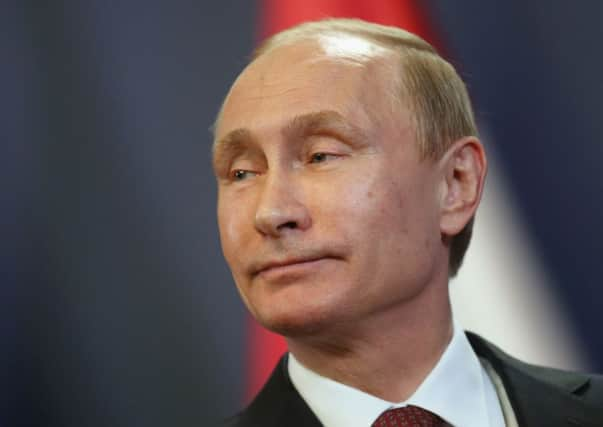Leaders: Putin is the victor over a toothless West


The ceasefire in the border conflict that has seen thousands die was a sham. Yesterday’s “organised withdrawal” of Ukrainian forces from the embattled town of Debaltseve was, in truth, a humiliating retreat. All in all, the crisis has been an unqualified success for Russian adventurism and the brutally hardline approach to international relations adopted by president Vladimir Putin.
Throughout this crisis the Russians have insisted that the rebel forces carving out a pro-Moscow enclave in eastern Ukraine had nothing to do with the mother country.
Advertisement
Hide AdAdvertisement
Hide AdThis was acknowledged in every western capital as a falsehood and yet Mr Putin has still managed to ignore international condemnation and keep up the pretence that the troops on the ground were not under his control. This was despite the rebels clearly having access to heavy Russian hardware, with tanks regularly seen crossing the Russian-Ukrainian border.
This has been a Russian land grab, pure and simple, following on from Russia’s annexation of the Crimea.
President Barack Obama has had grave doubts about the Franco-German peace plan under which the rebels would keep control of the territory they have gained in the conflict.
FOLLOW US
SCOTSMAN TABLET AND MOBILE APPS
Mr Obama believes this would be a reward for aggression, and it is hard to disagree with his conclusion. The lesson Mr Putin will have drawn is that force of arms is a strategy that works. Furthermore, he will have concluded that the West is too weak to counter Russian aggression in any form.
The Russian president is in a difficult position domestically. His country’s economy in crisis and western sanctions – although not enough to curb his territorial ambitions – have harmed Moscow’s financial clout. Russia’s vast reserves of gas – an economic trump card Mr Putin has shamelessly played in recent years in trying to force nations to heel – is not the advantage it once was, given the US exploitation of shale gas and the low price of oil.
Yet while Mr Putin wields Russian muscle abroad, either directly or through his proxies, he stirs in Russian hearts a renewed nationalist pride – this is sufficient to secure his position in the eyes of his public.
The question now is both simple and chilling: where next? Which of the many countries bordering the Russian republic, or operating within its sphere of influence, will be next to find pro-Moscow irregulars taking over government buildings under the thin pretence of “protecting” ethnic Russians?
And can these countries expect protection from the cowed and outflanked West? It would seem not.
Police chief with explaining to do
Advertisement
Hide AdAdvertisement
Hide AdSIR Stephen House has some explaining to do. Yesterday the Police Scotland chief constable was challenged over his version of events in a saga that has become emblematic of his tenure at the top of the single national force.
Scotland’s information commissioner said Sir Stephen was wrong when he said he had been forced to release “innacurate” data to the media on the controversial subject of stop-and-search incidents.
Lib Dem MSP and party justice spokesperson Alison McInnes yesterday said that a tranche of correspondence released by the commissioner “rebuts each and every point the chief constable used in his defence at the Scottish Police Authority”.
She added: “The facts do not match his claims.”
This is an unusually frank challenge to such a senior police officer from a member of parliament.
This saga does not reflect well on Sir Stephen. A chief constable’s authority must be unimpeachable, his statements must be capable of being relied on. To have his version of events challenged so directly can only serve to undermine that authority.
Once again it seems that Police Scotland’s lack of surefootedness on the crucial issue of accountability is at the root of Sir Stephen’s difficulties.
Accountability and transparency should be at the heart of the force’s operations and its engagement with politicians and the public.
And yet too often in recent months – over the use of stop and search powers and over the arming of officers on routine police business – seeking and ensuring public consent has seemed too far down Sir Stephen’s list of priorities.